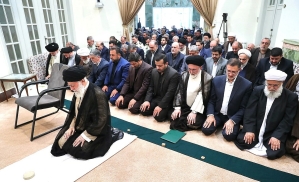
The conviction of an elderly Christian in Iran for attending a house church shows how the Islamist regime politicizes religious activity, according to leaked cases of 327 Christians charged with crimes related to their faith.
The Iranian-Armenian Christian from Rasht who was nearly 80 years old at his trial in 2022 was charged with “membership in the community under the name of a home church of ‘Zionist Evangelical Christianity’ with the aim of disrupting the security of the country”; “gathering and colluding against the country’s security”; “disturbing the public mind and disrupting social order through Christian publications with the aim of attracting Muslims”; and “insulting Islamic sacred things,” according to advocacy group Article 18.
The Christian, identified as Alexander B. and described by his attorneys as a “dignified and calm man of faith” who respectfully “adheres to the laws and systems of the Islamic Republic of Iran,” was sentenced to five years in prison.
His attorneys, Alireza Thaqfi and Mohammed Kialashki, told the court that describing mere attendance at Christian worship as “Zionist” and a threat to national security showed the prosecutor’s attempt to inflate the charges to justify an illegal conviction and disproportionate sentence.
“He was sentenced to five years in prison, which considering the age of the client …and his lack of any criminal record, and lack of knowledge about the prohibition of participation in friendly meetings and performing religious ceremonies [in a house church] and the absence of specific malice, is very heavy,” they told the judge, according to court records of cases in the Tehran area leaked in stages by Edaalate Ali since February.
As the Iranian regime is based on religious principles, the effects of state religion are seen in the prosecutor quoting Supreme Leader Ali Khameini: “From the spread of unrestrained and immorality, to the promotion of false mysticism, to the promotion of Baha’ism, to the promotion of the network of house churches, these are the things that the enemies of Islam are doing today with study, planning and foresight…to weaken religion in the society.’”
Likewise, the prosecutor quoted the Supreme Leader of Iran from 1979 until his death in 1989, Ruhollah Musavi Khomeini, as stating, “If we understand that in our Tehran, the centers of propaganda of the church, Zionism, and Baha’ism have been created, which mislead people and distance them from the rules and teachings of Islam, isn’t it our duty to destroy these centers that harm Islam?”
Armenian and Assyrian Christians whose Orthodox and Catholic faiths are legal in Iran “are aligned with the Islamic Revolution,” the prosecutor said, but “Armenian and Assyrian Christians in the Protestant religion, with their evangelistic nature and the mission of Christianizing Iran, are considered a security threat for the Islamic Revolution.”
Persian-language evangelical movements are supported by “fundamentalist evangelical Christians and Zionists” who regard Shia Islam as their biggest enemy and their religious duty to fight it, the prosecution stated.
“Since American Zionist Christians consider the Islamic Republic as their enemy, they do not stop any hostile efforts against Iran, and they use the evangelistic activity in Iran as an action against the security of the Islamic Republic,” the prosecutor stated, “by destroying and humiliating the dear Islam and promoting Islamophobia and casting doubts on the beliefs of Muslims, especially young people who are suffering for example from financial or emotional problems.”
The command and planning center of this alleged movement is located in the United States, accompanied by intellectual and financial support “of the Zionist regime” and England, the prosecution stated.
Describing house churches as “not approved by authentic Christians” and “deviant sects,” they asserted that the “deviant branches” of Christianity used house churches along with satellite networks, radio, books, the internet and the financing of “underground pyramid networks” to create deviation in the minds of Muslims to persuade them to join.
“Taking into account that the purpose of forming house churches and evangelistic activities by these sects in the Islamic Republic of Iran is to attract Muslims to Zionist Christianity, and it is completely dependent on the international Zionist intelligence services, with people converting from Islam there will be no trace of the Islamic Republic system,” they stated. “Therefore, the act of forming a house church, and evangelistic activity, is considered to be with the aim of disrupting the country’s security.”
The Christian’s attorneys formulated statements against these allegations, emphasizing that the generalities had nothing to do with the particular behavior of the Christian in the case.
“The repeated questions and interrogations [make] it quite clear that the motive of the prosecutor was only to…make the charge appear big and the accused so valuable that he can exchange them with the prisoners wanted by the government of the Islamic Republic of Iran for exchange in America,” they told the judge.
What prosecutors referred to as membership of an organization threatening national security was only attendance at prayer meetings and gatherings of groups of friends, they said, adding that a house church is simply a place for activities similar to those of any church.
“The most important part of the charge is ‘gathering to disturb the security of the country,’” the defense attorneys stated. “What were the client’s limited actions related to the country’s security? How was this big accusation against the client confirmed? From a legal point of view, there is no connection between the behavior of the client and the disruption of the order and security of our beloved country and the Islamic system, and no reason has been presented in the case.”
The prosecutor repeatedly used the term “Zionist” only to distort the importance of the Christian’s actions, thus accusing and punishing an innocent person, the attorneys stated. They added that actions threatening national security mean those that directly and knowingly target national security and intend to weaken it.
“In this regard, firstly the client had no intention of such an action,” they said. “Secondly, his action in participating in home meetings was just…to pray according to his religion. Therefore, the gathering of several people in one house does not mean an illegal organization.”
They described the prosecutor’s case as full of false statements, such as calling him an “evangelical visiting [pastor],” attributing statements to him that he never uttered and citing as destinations countries and provinces to which he had never travelled.
“The job of the client is mentioned as the ‘pastor of a house church of Zionist Christianity,’ while the job of the client is a driver,” they said. “The interrogator has no right to attribute a job to the client based on his imagination, which has nothing to do with the client and is a pure lie.”
The investigator in the charges against Alexander B. fabricated a definition of the word “evangelism” that was broadened only to suit his goal of convicting him according to terms of the Islamic Republic, attorneys said.
In the charge of aiming to attract Muslims, the irregular gatherings the Christian attended were with his fellow Christ-followers, and there were no Muslims present, they said.
“So far in this case there is not even a single example that a Muslim person was attracted to Christianity,” they told the judge.
He was charged with “insulting Islamic sacred things,” but there is no statement or evidence of such a charge in the case, they said. Nor was there any reason or evidence on filed for the charge against him of “acquiring illegal property.”
“The accusation is only because of the client’s statement that he received 600 dollars of aid from a church,” they stated. “While tithes are money that Christians pay to the church and not to a person.”
Iran ranked ninth on Open Doors’ 2024 World Watch List of the most difficult places to be a Christian.





